Illuminate is a spectacular immersive light festival, including a wide range of bookable events held from 15 to 28 November 2021 at Plymouth’s Royal William Yard and Market Hall. Coordinated by Real Ideas for 2021, this year’s Illuminate programme responds to COP26 and the international climate crisis with a thoughtful collection of beautiful work from local and national artists, including projection mapping, bioluminescent artwork, illuminated murals and interactive installations.
For this year’s iteration of the annual festival, Tom Milnes, a BA (Hons) Fine Art Lecturer and key academic launching the new BA (Hons) Creative Technologies at Plymouth College of Art, has been commissioned by the StudioLab for Embodied Media, as part of the iMayflower project, to create a new version of his ‘Invisible Cities’ project for visitors to interact with in Market Hall. Additionally, five new art projects have been created for the festival by current students in Animation and Games, Craft and Material Practices. Young Arts students from the college are also responding to the climate crisis with a stained glass-style installation made from scrap plastic. Live environmental data captured by Smart Citizen sensors around Plymouth will be creatively visualised in an immersive installation developed by Plymouth College of Art’s Smart Citizens Programme and local electronics expert, Lee Nutbean.
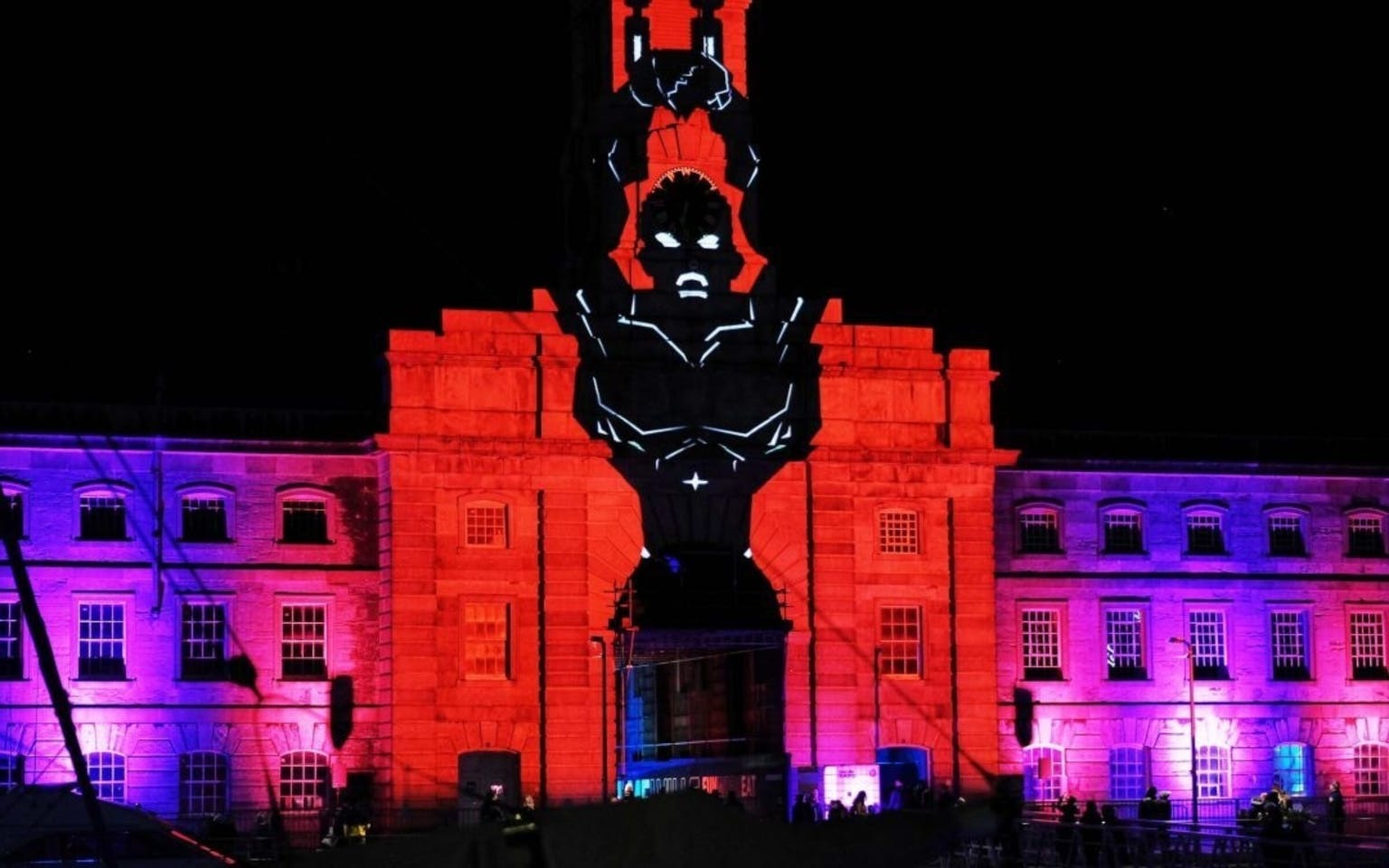
Plymouth College of Art student work at Illuminate 2019
Stephanie Owens, Head of Plymouth College of Art’s School of Arts + Media, said: “Plymouth College of Art has long been a champion of city-wide cultural events that galvanise our student's creative skills in new ways and offer opportunities to give something back to communities around the city. We have a firm commitment to continuing to work collaboratively with cultural partners across Plymouth on the Illuminate festival, which consistently offers excellent opportunities for emerging and established artists. We are proud of the innovative, challenging and beautiful responses to climate change made by our students, staff and resident artists for this year's festival.”
Bookable event tickets are needed to visit Illuminate installations at Market Hall, while the Illuminate installations across Ocean Studios in Royal William Yard are covered by a general attendance ticket.
Tom Milnes’s ‘Invisible Cities’ is a morphing and decaying virtual world where visitors to Market Hall from 15 to 28 November can wander the canals of Venice, strewn with e-waste, watching videos of media ecological wastelands, and exploring a changing world that confronts the viewer with the fragile biological impacts of climate change. Tom was commissioned as an Artist Fellow for Illuminate by Plymouth College of Art’s StudioLab for Embodied Media, a recently launched multidisciplinary team of artists, technologists and researchers who are collectively motivated to think about how society can approach the integration of biological and computational systems in a more sustainable and ethical way for the future.
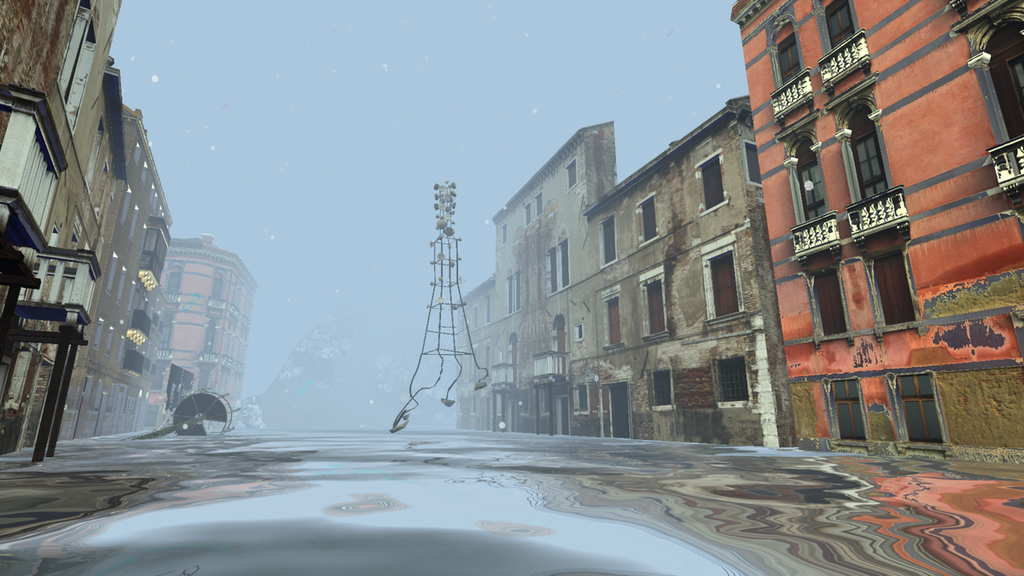
Still from Tom Milnes’ ‘Invisible Cities’
Innovative creations from Plymouth College of Art students
Students from across Plymouth College of Art’s undergraduate and postgraduate courses were selected from open submissions as part of a competitive process to exhibit in Illuminate 2021, including a range of collaborative projection-mapping animations from the School of Arts + Media.
MA Ceramics student Owen Rees is creating ‘The Glowing Outdoors’, a new ceramic installation. Second-year BA (Hons) Animation & Games students Leah Smale and Helena Bone are working together on a new projection-mapping project, ‘The Cycle of Destruction’; Alex Straw, Katie Bird and Tiffany Anderson are working together on ‘Whale, We’re Screwed’; Maximillian Rueth and Jack Polley are working together on ‘Mother Earth’; and Taylor-Paige Timmins is working on ‘Stop the Change with our Climate’.
A large number of the undergraduate students selected to contribute to Illuminate this year previously studied Plymouth College of Art’s A-level equivalent Pre-Degree courses or the college’s Foundation Diploma in Art & Design, showing the benefits of the extra years of specialist creative education.
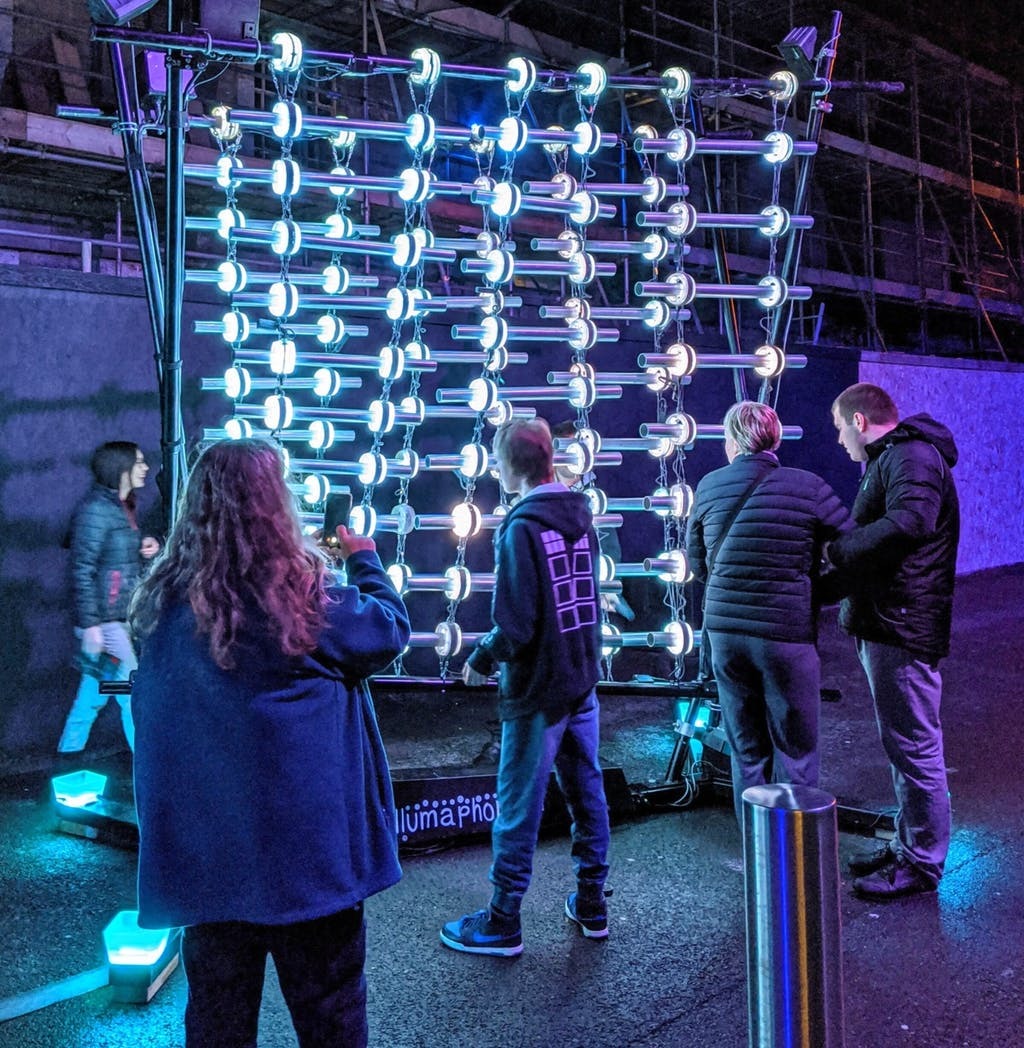
Illuminate 2019
'Colours of the future'
Young Arts students aged 9 to 16 from Plymouth College will shine a light on the environmental crisis ‘Colours of the Future’, set inside the windows of Market Hall. The students, from across the South West, have worked together to create their own version of stained glass from scrap plastics, highlighting their feelings and response to the climate crisis and the environmental problems that will be inherited by the next generation. Young Arts Clubs meet weekly on a Saturday morning and during holidays at Plymouth College of Art.
Live environmental data visualisation
Live environmental data captured by Smart Citizen sensors around Plymouth will be creatively visualised in an immersive installation at Market Hall from 6pm on Friday 26th November, as part of a bookable discussion session asking ‘What new approaches can we take to manage the impact of changing weather patterns?’, also featuring guest speaker from Plymouth College of Art’s Smart Citizens Programme, Elizabeth Zahoui.
Developed by Plymouth College of Art’s Smart Citizens Programme and local electronics expert, Lee Nutbean, the custom-coded installation visualises the local environment (such as sun, clouds, rain and hills) by collating data collected by environmental sensors such as humidity, pollution levels, air temperature and barometric pressure from Plymouth and other cities around the world.
The environmental data used to inform the installation is captured by sensors, known as Smart Citizen kits, installed across Plymouth and the globe. Plymouth-based Smart Citizen kits were assembled and coded by local people during six-week training sessions led by the Smart Citizens Programme at Fab Lab Plymouth. Book tickets to view the immersive installation at Mark Hall here. This activity is part of the iMayflower project and has been supported by The Department for Digital, Culture, Media and Sport, who fund the Cultural Development Fund, which is administered by Arts Council England.
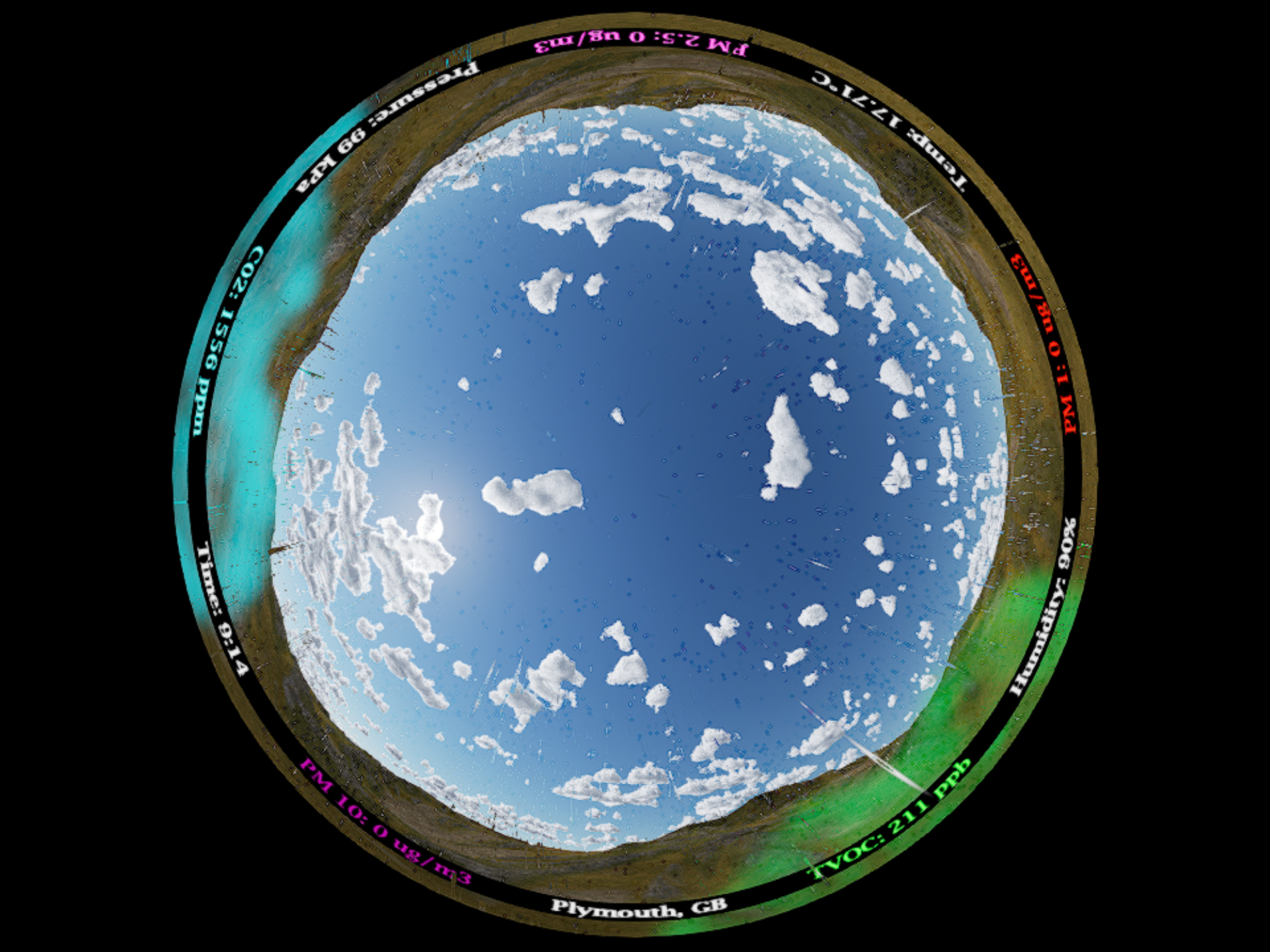
Smart Citizens and Lee Nutbean's immersive installation at the Market Hall
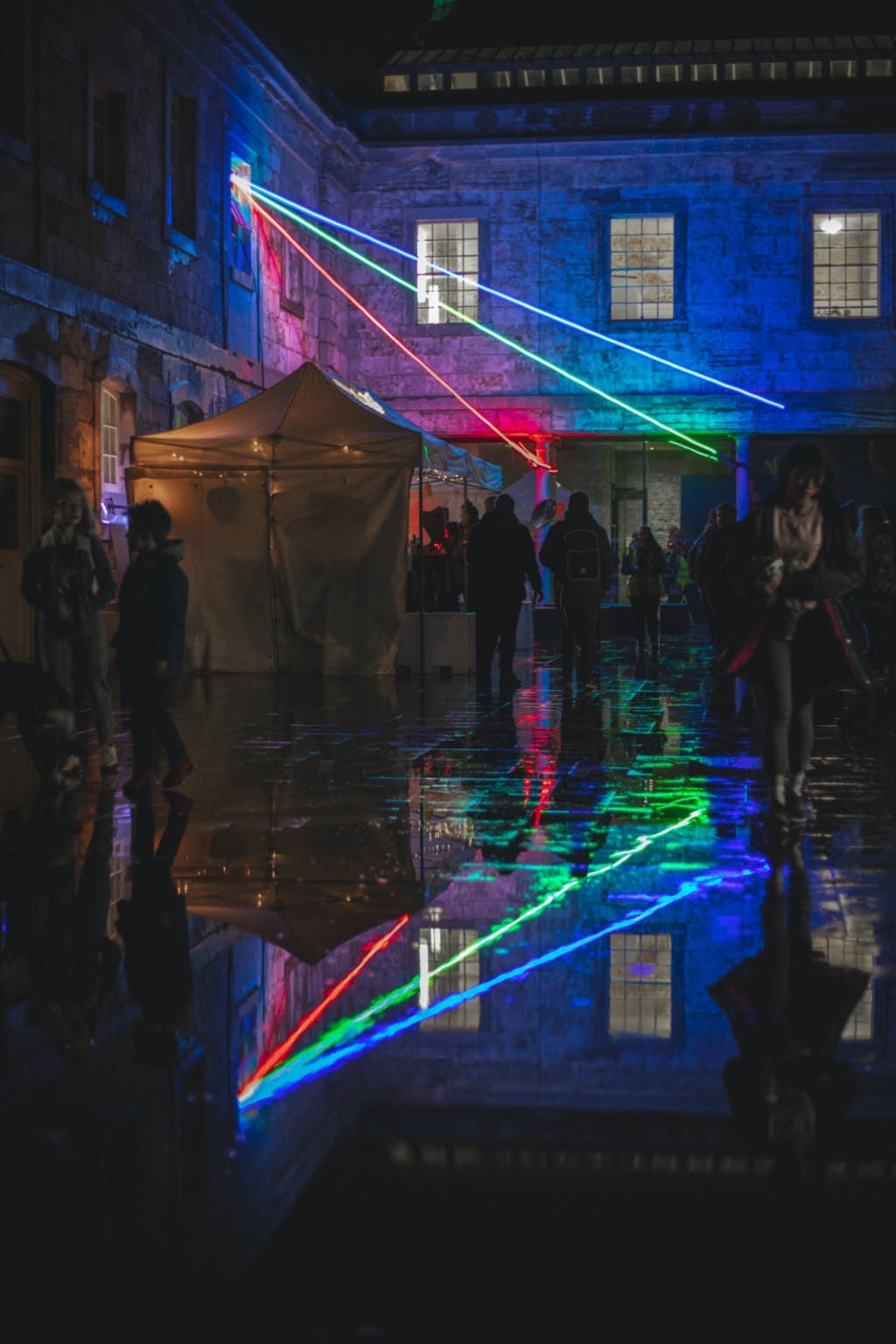
Illuminate 2018
Illuminating Plymouth
The Illuminate Festival stems from a longstanding collaboration between Plymouth College of Art, Real Ideas, University of Plymouth and Plymouth Culture
Students from Plymouth College of Art regularly attend a range of international events to broaden their horizons, network with industry professionals and develop new cutting-edge skills. From 2015 to 2018, as part of the Euranim project*, designed to boost the skills of early-career animators with projection-mapping skills, BA (Hons) Animation & Games students from Plymouth College of Art attended Fete de l’Anim, France, in 2017 and 2018, participating in intensive 2D and 3D animation and immersive video-mapping workshops.
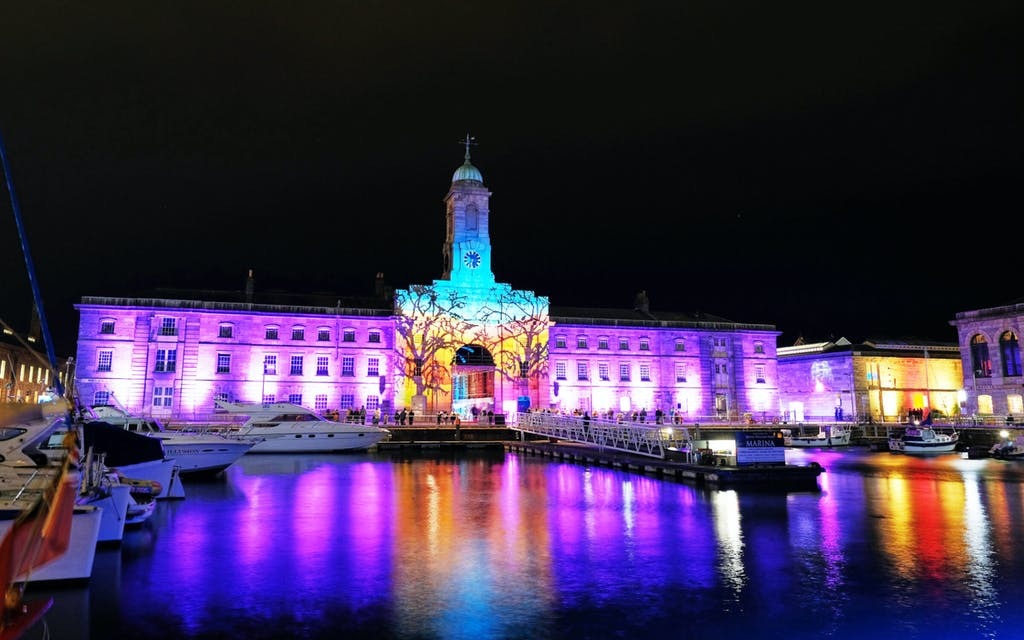
Outcomes from the Euranim project included significant support to the transformation of Plymouth’s Illuminate festival, which in 2016 comprised a light parade through the city and in 2017 developed as part of Euranim into an international light festival at Plymouth’s historic Royal William Yard.
Since then, fifty BA (Hons) Animation & Games students from Plymouth College of Art put their projection-mapping skills to use on the side of Royal William Yard’s Melville Building in 2018, working with guidance from Plymouth College of Art graduate Jamie Knight. The next year students from across Plymouth College of Art’s School of Arts + Media transformed the façade of Royal William Yard’s impressive Mill’s Bakery through projection-mapping at Illuminate 2019, alongside headline artist Xavi Bové.
Ian Hankey, Principal Technician at Fab Lab Plymouth in Plymouth College of Art, recently completed a successful campaign with Crowdfunder for the Upcycled Glass Project, working with Andy Bradford, a farmer from Brimpts Farm in Dartmeet, Dartmoor, and Richard Glass, an award winning designer and expert glassmaker. As a result, Ian and a number of expert colleagues are now launching the Upcycled Glass Company CIC.
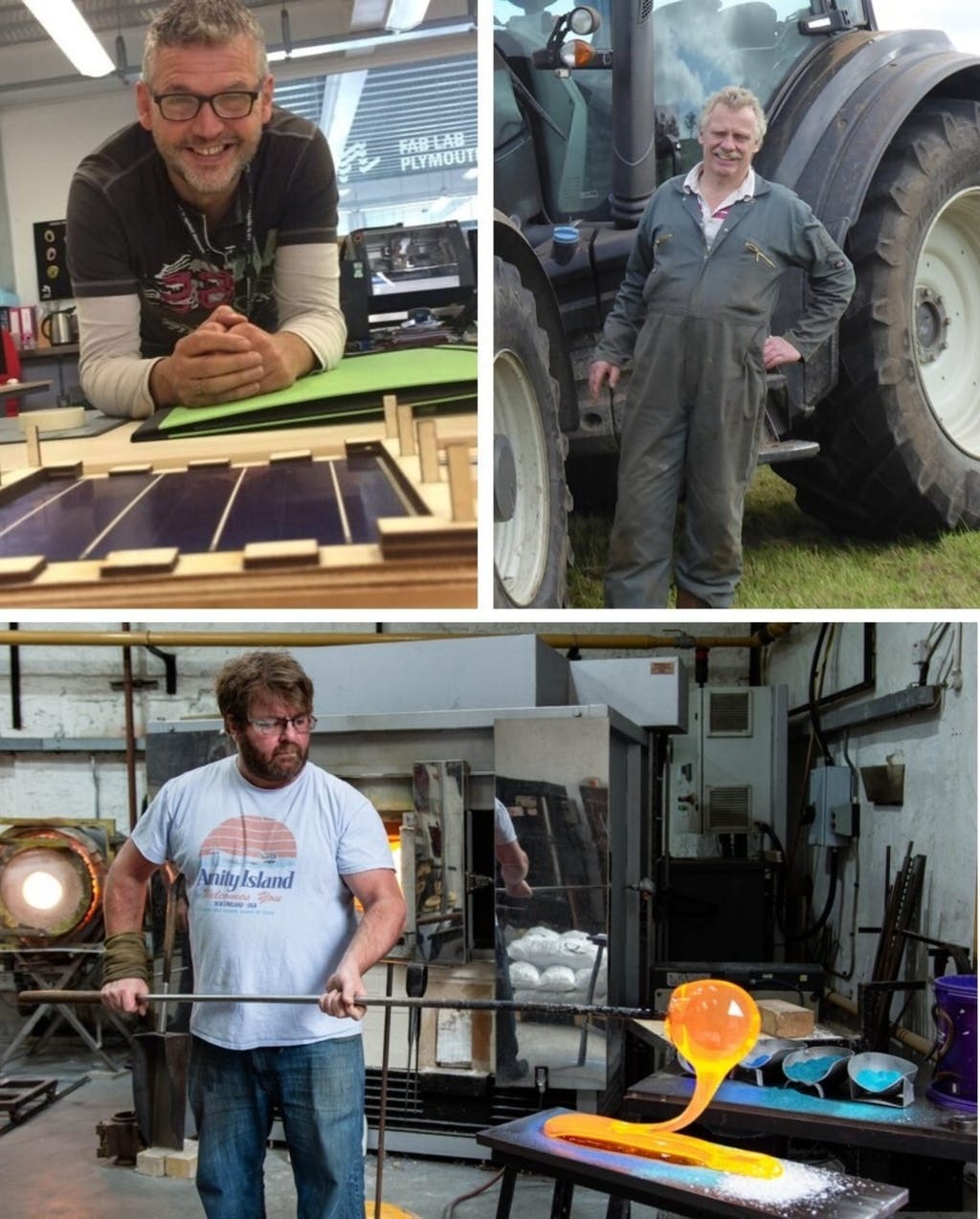
Ian Hankey (top left), Andy Bradford (top right) and Richard Glass (bottom)
The Upcycled Glass Project Crowdfunder successfully raised the initial funding of over £10,000 to build a new sustainable glassblowing workshop on Brimpts Farm, where the team intend to implement a circular economy model and upcycle local waste glass (the majority of which cannot currently be recycled) into new glass suitable for use in handmade art and design products, utilising a mixture of new technologies, modern farming methods and historical glass mixing processes that go back to the 17th century.
Devon Climate Challenge has provided £5,000 of funding to the campaign, as part of the #BackTheFuture initiative, in which Devon County Council and Crowdfunder have teamed up to support projects who are tackling the climate emergency.
‘We were delighted that the Upcycled Glass Company received a large match fund pledge from Crowdfunder’s #BackTheFuture, to support turning its ideas into reality. This might not have happened without Crowdfunder and Plymouth College of Art’s collaboration on the iMayflower project, leading to Ian’s involvement through Fab Lab Plymouth. He quickly realised that crowdfunding would be a perfect way for him to raise pump priming money for his own creative business,’ said Dawn Bebe, Director of Crowdfunder.co.uk.
The concept for the Upcycled Glass Company CIC brings together multiple strands of glass expert and Master Glassmaker, Ian Hankey. After initially leaving school with no qualifications due to undiagnosed dyslexia, Ian has worked in the glass industry for over 40 years, from his first apprenticeship at Pilkington Glass and later managing the hot glass workshop at the Royal College of Art and managing Teign Valley Glass Studios, to his work to establish in 2014 and subsequently manage Fab Lab Plymouth at Plymouth College of Art.
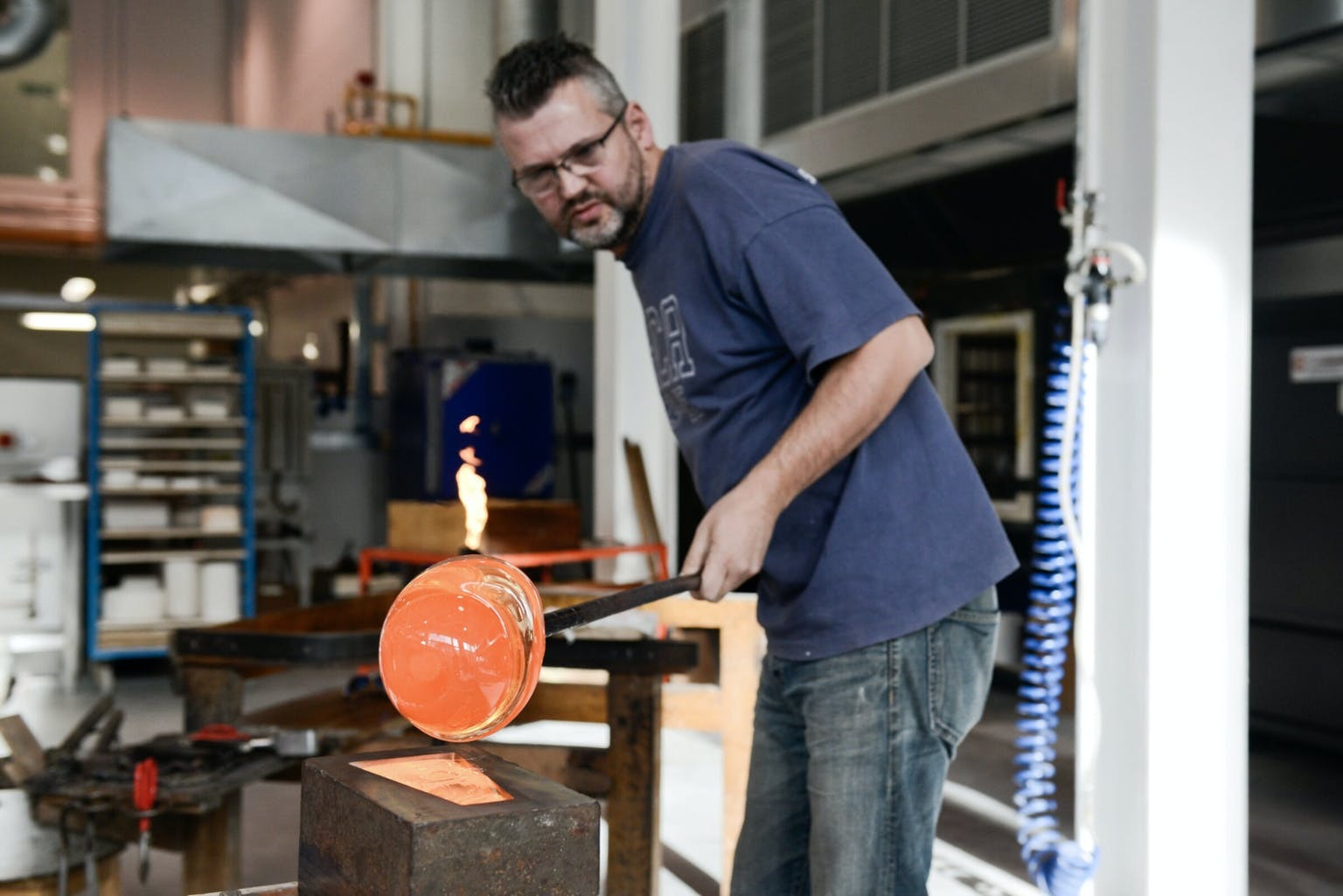
Ian Hankey blows glass at Plymouth College of Art
During this period, Ian studied for his BA (Hons) 3D Design at Buckinghamshire College, received a Commendation for his MA at the Royal College of Art, and while working as Hot Glass Instructor at the RCA, he also gained a Distinction on his PGCE in Teaching and Learning Art, Design and Communication at the London Institute. Ian has delivered papers about glass and methods and approaches of thinking and making at conferences hosted by Cambridge New College, The V&A, Liverpool University, University for Creative Arts and Plymouth College of Art, and his research has been published by the Society of Glass Technology, Columbia University and Plymouth College of Art.
In 2018, Ian stepped back from his role as Manager of Fab Lab Plymouth to a role as Principal Technician, in order to spend more time working in the glass department at Plymouth College of Art, and to pursue his personal work recreating a number of historical glass processes, particularly focusing on recipes and processes from the Renaissance. Alongside his work with glass, Ian has developed his own skills in the Fab Lab, learning specific and advanced CAD CAM processes, and researching historical glassmaking processes. During this period he became a qualified Autodesk Instructor and expert in CAD (Fusion 360, Rhino, Meshmixer, Keyshot), gaining expertise in 3D printing, 3D scanning, CNC milling and routing, laser cutting, waterjet cutting and vinyl cutting.
Ian said: “Throughout my life, dyslexia and reflective rationality have shaped the path of my career, which is to say that I work with my hands and my heart. This direct approach has enabled me to solve problems at times when others could not. My tacit understanding of and approach to glass led me almost 20 years ago to help Imperial College and The V&A to develop a ‘cure’ for glass disease (the corrosion of historical Venetian glass), solving a problem that many material scientists and experts in the field could not.
“As a result of working with glass for most of my life, I’ve had incredible opportunities to develop new techniques, recreate old methods of glass blowing and think about how some of these skills can be combined to solve environmental problems that face us as a society. Adding my knowledge of glass to some of the collaborative opportunities that we create in Fab Lab Plymouth have led to so much innovation. I’ve spent over 20 years developing methods of reducing emissions and reducing the costs of building and running glass equipment, from creating a portable glass furnace that cuts emissions over traditional furnaces by up to 70% to developing more efficient solar panels and helping to develop small-scale CO2 recapture systems.
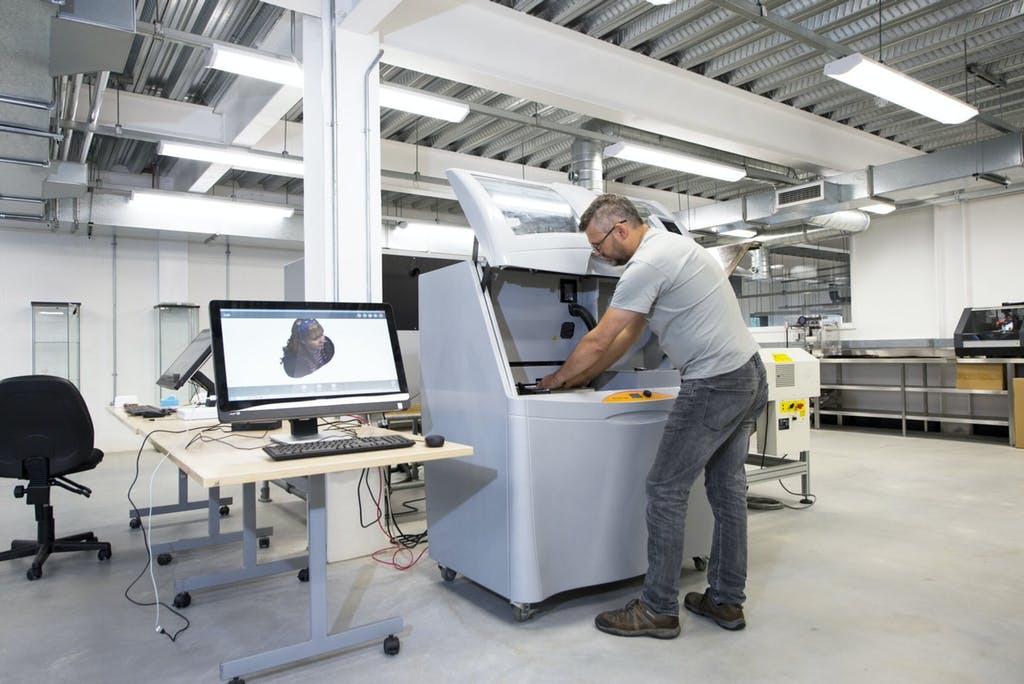
Ian Hankey in Fab Lab Plymouth
“Whether we like it or not, we’re living through a climate emergency. Everything I’ve seen and done in my life points to the fact that for every environmental problem that we solve, someone with money is going to come along and try to use that solution to create more money for themselves, undermining the positive change that could have benefited society. The only way to tackle societal problems of sustainability is to change the framework we’re working in and find new ways to work together. The Upcycled Glass Company CIC is my attempt to bring into the world one small part of the change that we need to live in a more sustainable way.
“Thanks to everybody who contributed to our successful Crowdfunder, we can start work building a small furnace in the grounds of Brimpts Farm on Dartmoor, which we hope to have finished by the end of 2021. Did you know that UK glassblowers pay up to £2,500 a ton to import ‘art’ glass material from the EU? Worse than that, in the UK and EU, we recycle about 71% of container glass, but end-of-life building waste glass, such as window glass, is almost never recycled into new glass products, and mostly ends up in landfill
“On Brimpts Farm in 2022, we plan to use a mix of new technologies, modern farming methods and historical glass mixing processes to use the furnace that we’ve built to develop a technique to refine the waste glass from nearby Teign Valley Glass Studios. By melting waste glass and using locally harvested bracken from Brimpts Farm (with the added bonus that in harvesting these plants we’ll create wildflower meadows), we’ll reduce emissions for road transport and shipping across the world, and demonstrate a way to reduce the landfill waste glass mountains, which are recognised globally as a major environmental problem.
“Additionally, through my work at Fab Lab Plymouth, I’ve provided technical support to Barnaby’s Brewhouse, helping to develop a small-scale CO2 recapture system. If I fit a similar system to the new glass furnace on Brimpts Farm, we’ll be upcycling waste glass that companies currently pay to dispose of, and burning bracken from the local farmland to extract the chemicals that we need. If we power the furnace equipment with methane from the cows and farm slurry, at the end of the process, the only waste product that we create should be water.
“That’s just the start of our sustainability plans, working as part of a circular local economy, where businesses work together for their own benefit, for the benefit of the community and the environment. Alongside acting as Managing Director of the Upcycled Glass Company CIC, I’m going to continue my work at Plymouth College of Art. Fab Lab Plymouth is based here, in an art school with over 160 years of history, allowing new technologies and traditional methods of making to come together, and this is where the solutions to so many problems in society begin to come together.”
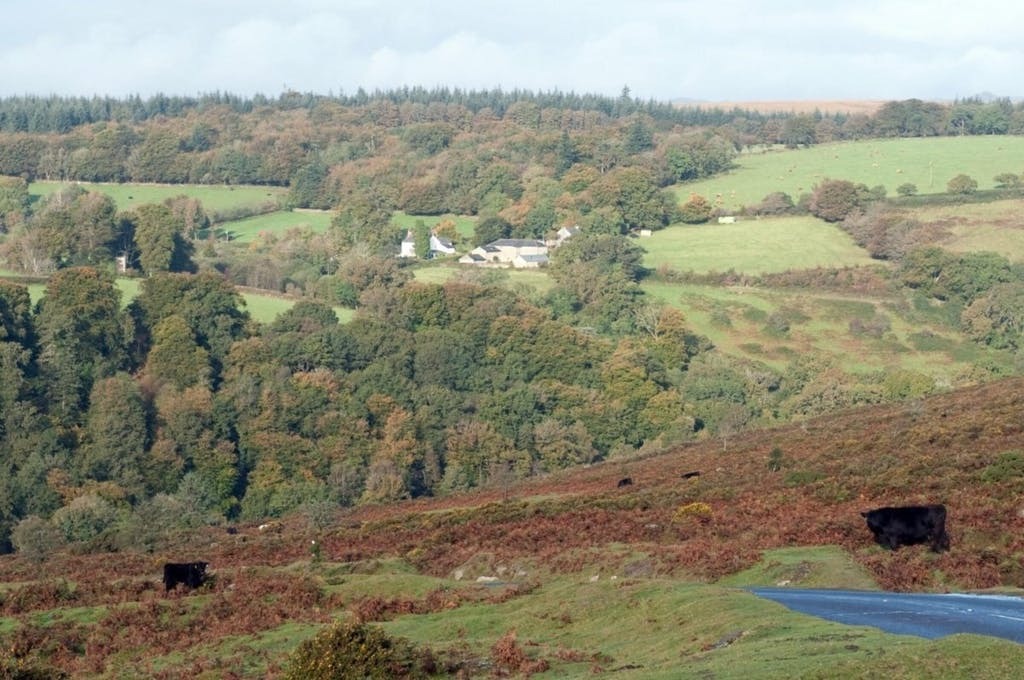
Brimpts Farm land
Ian is now preparing to launch the Upcycled Glass Company CIC, with Brimpts Farm owner Andy Bradford, expert glassmaker Richard Glass, Dr Katie Shanks, Dr Sarah Fearn, Victoria Oakley ACR FIIC, and IT and data expert Jamie Kaye.
Dr Katie Shanks has expertise is in designing optics for concentrator photovoltaic applications (including their development from concept to manufacturing and experimental validation) and is currently working on the use of novel materials, such as plastics and biomimicry surface structures, for CPV optics, as well as building integrated CPV windows.
Dr Sarah Fearn is a Research Officer in the Department of Materials at Imperial College and manages the surface analysis lab. Her area of expertise is Secondary Ion Mass Spectrometry (SIMS), ion beam analysis, and materials science. It was during her first post-doctoral studies at Imperial in conjunction with the V&A, that Sarah was introduced to ancient glasses, their properties and possibilities, working with the help of Ian Hankey to monitor the changing composition of replica Venetian glass as it corroded in ambient air.
Victoria Oakley is a conservation professional with 40 years’ experience working in museums, most recently as Head of Objects Conservation Section at the V&A Museum. Her practical expertise lies in the conservation of ceramics, glass, enamels and wax objects, with a particular interest in the chemical deterioration of historic vessel glass.
Together, as the Upcycled Glass Company CIC, this team of experts will collaborate to make the vision of a circular economy model for upcycling waste glass into a reality.
Find out more about Ian Hankey’s work with the Upcycled Glass Company in his Smart Citizens Sustainable Design Talk, ‘Rethinking glassmaking technologies and sustainable business models’, part of the Plymouth Social Enterprise City Festival, hosted by the Plymouth Social Enterprise Network (PSEN). The event takes place online from 5:30pm to 7pm on Thursday 18 November 2021. Register for your free ticket.
Support was given to Ian as part of the iMayflower project and has been supported by The Department for Digital, Culture, Media and Sport, who fund the Cultural Development Fund, which is administered by Arts Council England.
Local people have been harnessing the power of solar energy and digital technology to create their own sustainable illuminated artworks, in workshops hosted by Plymouth College of Art’s Smart Citizens Programme and South West-based art collective, Art and Energy CIC.
Fourteen local people and students attended these two-part workshops, held three months apart at Fab Lab Plymouth. During the workshops, participants learned new skills in reverse glass painting, soldering solar cells, computer aided design and laser cutting, in order to construct their unique artworks. Charged by sunlight, these solar-powered artworks light up at night, illuminating the participants’ designs.
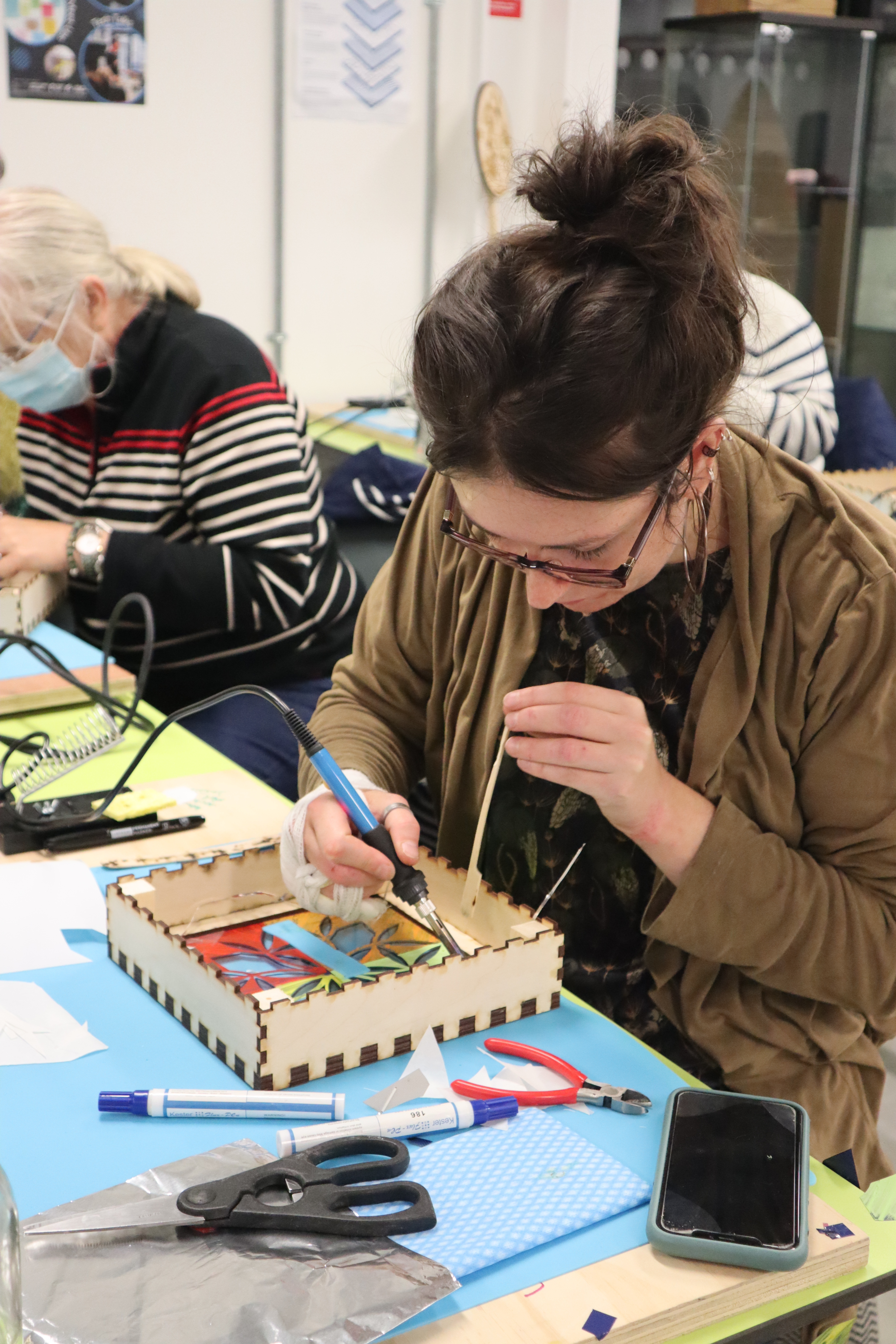
Participant Kerry Brosnan soldering her solar cell circuit (Photo credit: Smart Citizens Programme)
Through creative projects, Art and Energy CIC develop artistic responses to the climate emergency, to help people engage creatively with the huge changes we experience with our energy system.
Their Moths to a Flame project, co-led with Plymouth Energy Community, is working with nationwide collaborators to make 20,000 moths and record messages about the Climate Emergency to turn calls for urgent action into a magnificent mass-participation art installation to be displayed at the 26th UN Climate Change Conference of the Parties (COP26), taking place in November in Glasgow.
In November 2020 Plymouth Energy Community and Art and Energy CIC launched a campaign with iMayflower partners Crowdfunder to hold free Moths to a Flame creative activities in Plymouth throughout 2021. Theirs was one of seven within the Plymouth Climate Challenge hosted by Plymouth City Council, with their project raising £45,189.
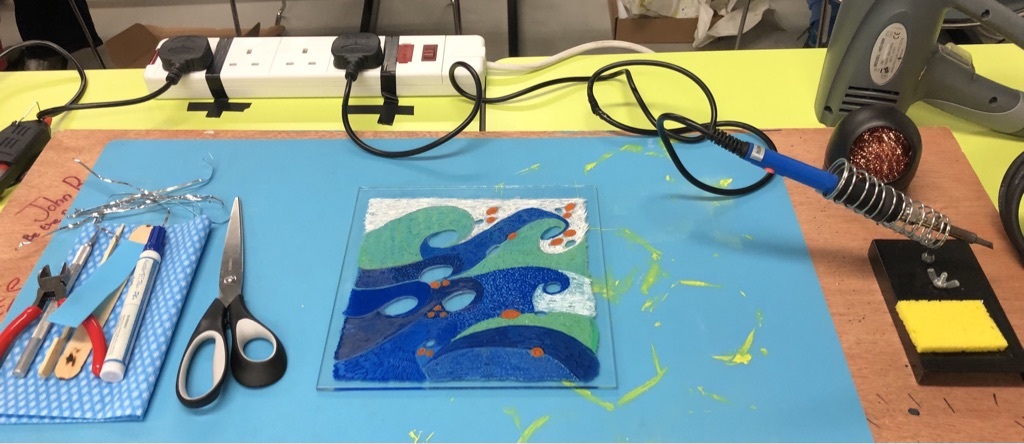
Participant Lorraine England’s reverse glass painting, ready to add the solar cells (Photo credit: Lorraine England)
Workshop participant Lorraine England, a retired nurse and midwife who now works as a maker and workshop tutor, said: “The workshops with Smart Citizens and Art and Energy really kindled an interest in solar power for me and how it can be incorporated into our lives, not just from a functional but also from an aesthetic perspective. Within my own creative practice I make predominantly in felt, fibre and textiles. I left Fab Lab Plymouth trying to consider how solar light could be incorporated into the illumination of artwork made from wool. Overall, I found the workshops to be fascinating, engaging, innovative and inspirational.
“During my research before and afterwards, I found many remarkable global projects where solar power has been merged with creative practice, in beautiful and functional ways such as solar trees or architecture. This inspired me to look into the history and principles of solar-powered systems, so that I could better understand the wiring process. This was a fascinating lesson in basic electrical circuitry and energy which I wish had been taught in science when I went to school.
“From both a societal and cultural perspective I think that the Smart Citizens Programme is timely and very relevant. Plymouth not only supports a vibrant creative community but it is one in which there are huge economic and social challenges. There is huge social deprivation and poverty in the city and an energy crisis starts to loom. With national energy costs escalating, many families are going to suffer from energy poverty. There is therefore an emergent need to make this technology more accessible to these groups of individuals, in a way that is affordable.”

Participants Kerry Brosnan (left) and Vanessa Crosse (right) with their finished solar artworks (Photo credit: Smart Citizens Programme)
Sarah Trotter also took part in the workshop. A local experimental visual artist and play and support worker, Sarah said: “I learnt so much during the workshop and about Art and Energy’s work within communities. I really enjoyed learning about the Fab Lab processes and laser cutting and also how solar power cells actually work - my mind was blown and I loved the connection between the two processes! It was a truly enlightening workshop, both in terms of creativity and in gaining knowledge into how energy can be created by the sun. I was so chuffed with my completed artwork at the end of the workshop.
“The workshop has supported my knowledge around sustainability and how much of an effect it has within the world - however small a contribution, education will make a huge difference for our futures. It has made me more mindful within my own practice and something that I am looking to integrate more within the way I work and resources and materials that I use.”
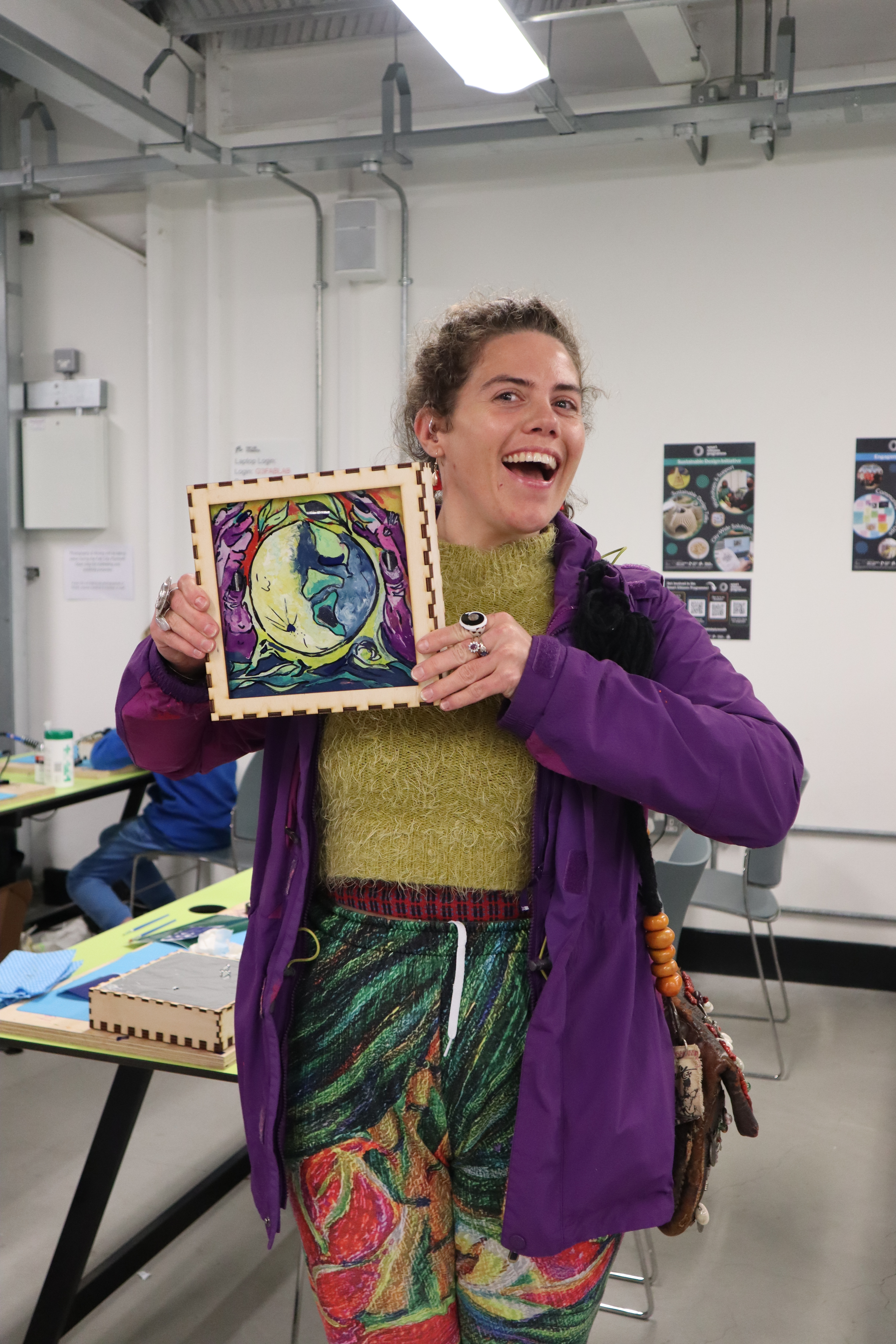
Participant Sarah Trotter was ‘chuffed’ with her finished artwork (Photo credit: Smart Citizens Programme)
Jenny Ayrton, Director of Art and Energy, said, “When I first graduated from Plymouth College of Art as a glass artist, environmental issues weren’t particularly on my agenda, however the experience of making my own solar artwork with other members of the collective brought home how the future is in our hands, and it is possible to live a fulfilled creative life whilst also making work that responds to the climate emergency.
“A creative approach to learning and engaging with sustainable energy helps people find their own ways to join in, and also alleviates eco-anxiety, which is a challenge for anyone who wants to take responsibility and make a difference.
“Working with the Smart Citizens Programme has opened up new ways of working, allowing us to combine our solar artworks with digital technologies such as laser cutting, and engage new audiences with creative approaches to solar energy.”
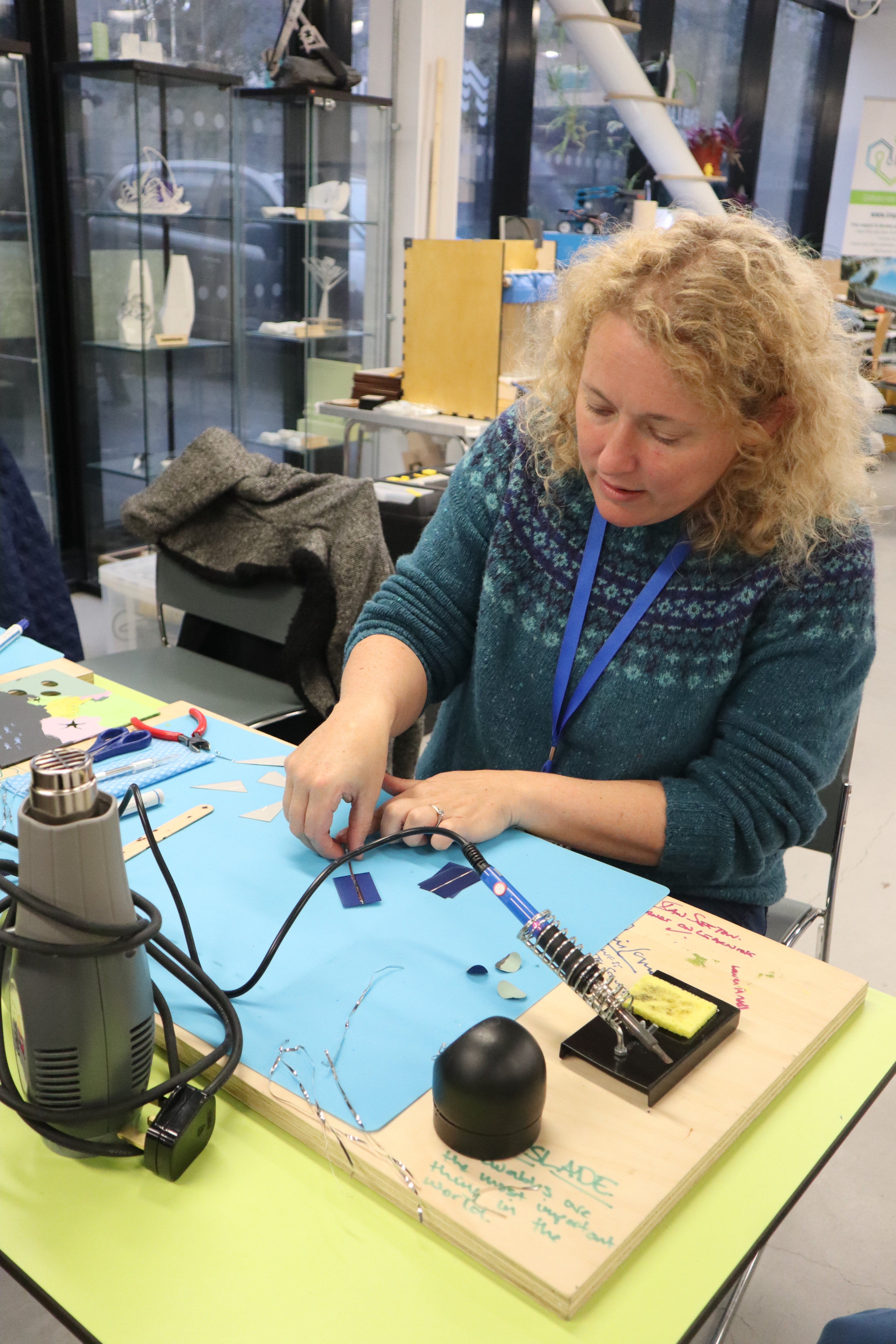
Chloe Uden, founder of Art and Energy, demonstrating how to solder the solar cells (Photo credit: Smart Citizens Programme)
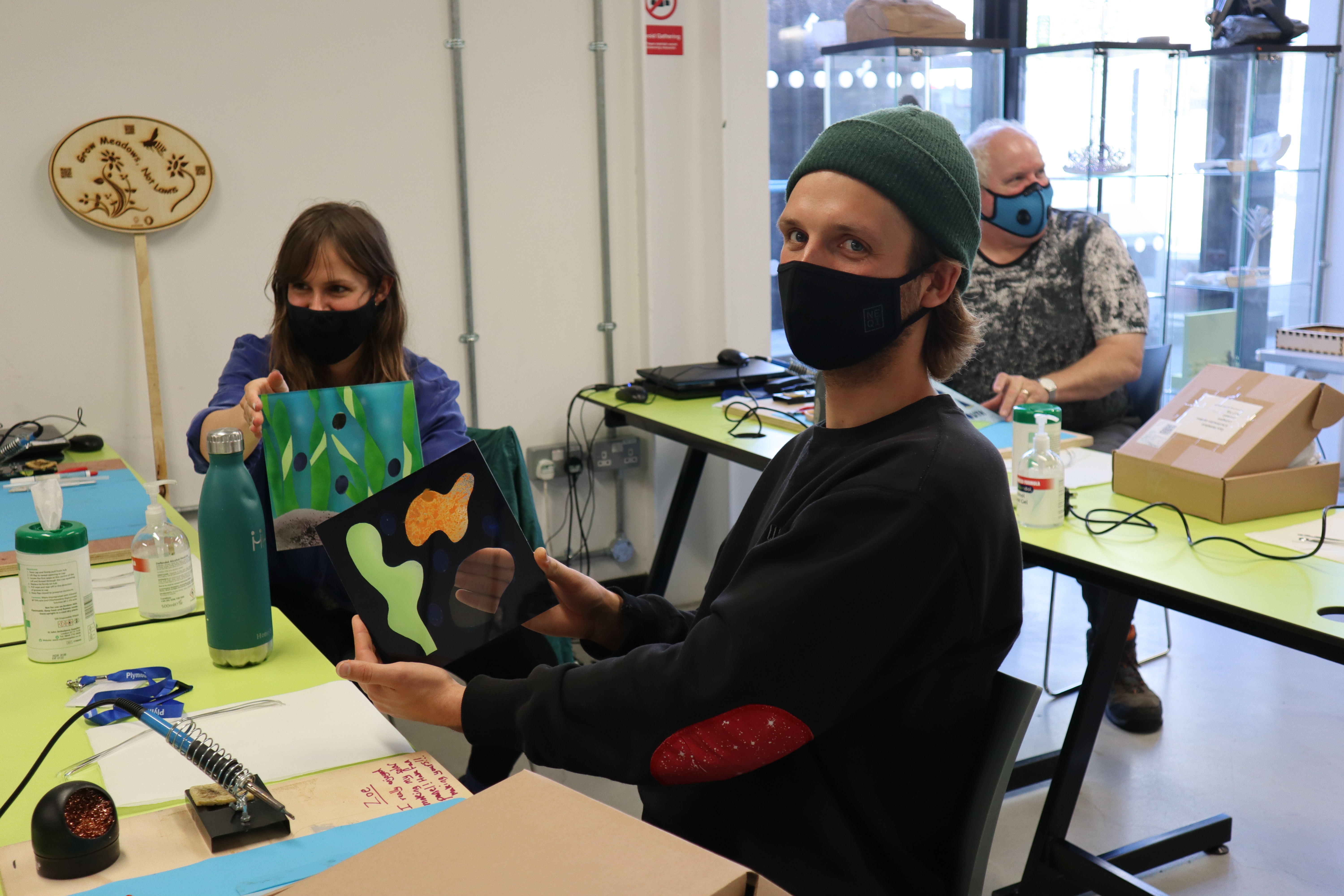
Participants Chloe Georgakis and Will Harvey with their reverse glass paintings (Photo credit: Smart Citizens Programme)
Art and Energy CIC launched in 2018 with a vision to transform the look of solar panels through art, in order to brighten up our cities, celebrate a diversity of culture and inspire more people to consider using renewable energy. Ian Hankey, the Principal Technician at Fab Lab Plymouth and a master glass craftsman with extensive experience gained from the Royal College of Art, Pilkington Glass and Teign Valley Glass, worked with Art and Energy to develop a range of mark-marking processes using traditional glass processes and digital subtractive manufacturing suited to the photovoltaic panels. These panels were tested by Dr Katie Shanks at the Environment and Sustainability Institute at the University of Exeter and now form part of Art and Energy’s ongoing work. Jenny Ayrton, one of the Directors at Art and Energy, is a Plymouth College of Art graduate and practicing artist, specialising in sand and kiln cast glass, etching and engraving.
Art and Energy CIC have benefited from collaboration with expert staff members from Plymouth College of Art, Fab Lab Plymouth and Crowdfunder as part of the Environmental Futures & Big Data Impact Lab and later the iMayflower Smart Citizens Programme.
The solar-powered art workshops are part of the iMayflower project and have been supported by The Department for Digital, Culture, Media and Sport, who fund the Cultural Development Fund, which is administered by Arts Council England.